"A Good Head and A Good Heart"
Mr. Muhammad Ali Ghulam
Muhammad talks about how his gut feeling helped him
shape a successful career
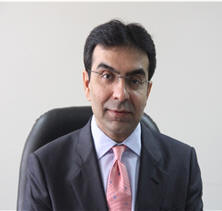
Your career has charted many organizations, big and
small, in many industries. Has the variation been
intentional? Why?
It was intentional but not planned in most cases.
Looking back, it now seems strange that the planned
ventures did not do as well as the unplanned yet
spontaneous ones. This doesn't mean that planning leads
to wrong decision, but perhaps some of us get so lost in
the details that the gut feeling of a project or a
venture gets lost in the process. I have always had a
high risk appetite, coupled with strong ambitions and a
belief in hard work. This led to undertaking various
entrepreneurial ventures in sectors ranging from the
capital market to manufacturing concerns across
different countries. Further, my decisions were driven
by the desire to get the most done in one lifetime and
to quit when I stopped enjoying my work, which made me
change and fortunately, grow.
With the experience you have gained while navigating
multiple industries, what would you say about the future
of Pakistan's industry and economy in general?
Pakistan's economy and industries have a tremendous
potential, however whether we are able to turn that
potential into reality is anybody's guess. Despite a
brain drain over the last few decades, we still have a
large base of experienced professionals in the private
sector with strong work ethics. The reason we are not
able to live up to the country's potential is lack of
clarity of the role of non-technocratic public sector
officials in decision making. Ill-informed decision
making has, over the years, resulted in sub-optimal
policies and systems leading to systemic inefficiencies.
Added to this is a non-transparent and draconian
accountability system which encourages inability to take
and implement decisions. Strong geo-political
positioning, sizeable population and availability of
minerals and other resources are natural advantages
which can only be translated to economic and industrial
inclusive growth with the right set of leadership in
various areas. However, fortunately there has been a
recent increase in public awareness and a desire in some
of our national institutions to check this consistent
deterioration, which are expected to put Pakistan on the
path of economic and industrial growth in the future.
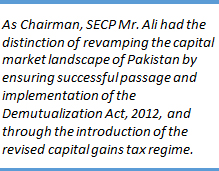
Professionally every role I have held has been
fulfilling in its own way as most of my career has been
spent converting ideas into businesses in the face of
challenges which required constant strategic thinking.
However, at an emotional level, it was my role in the
public sector, as Chairman of Securities and Exchange
Commission of Pakistan which was much more fulfilling
than any role in the private sector that I had, because
the impact of decisions which I took during my SECP
tenure was at a national level, allowing me to in some
way to contribute towards addressing the economic needs
of our nation.
In
the course of your career, you have worked in both the
private and the public sectors. What is the major
difference you have felt between the two?
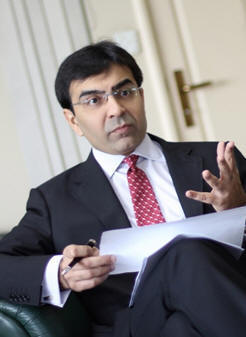
You very recently visited and toured the IBA campus.
Apart from the very obvious infrastructural changes,
what difference (if any) did you feel between the IBA of
today, and the IBA you studied in?
Besides infrastructure, an increase in the number of
students and an introduction of various new programs, I
felt three major differences. First was a relaxed
environment which should lead to freer thinking and
openness of discussion. Second was a better qualified
and more experienced faculty which should impart better
knowledge among the student body. Third was a high level
of motivation among various academic and non -academic
units showing that most units are consistently improving
and working towards betterment of the organization. As I
had coordinated the visit of my class, these changes
became more evident from the efficiency with which
various departments came together to make our trip a
memorable one.
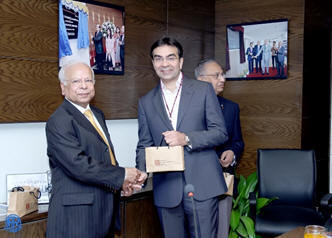
Yes, I take pride in stating that IBA is one of the few
institutions which has not deteriorated over the years,
rather has gotten a lot better over the last few decades
which should have been the case with most academic
institutions. We have IBA graduates in our various
organizations and they still are among the best in the
country. Here I would like to add one concern which I
have always had with our business schools. IBA produces
graduates for a job environment. A very important
quality which IBA should work on is inculcating the
ability to take risk. No country has achieved economic
growth without new ideas and the ability to convert
these ideas into real businesses. I hope and believe
that IBA's Center for Entrepreneurial Development is
playing an important role in that direction but this is
a quality which every IBA graduate should possess.
Important pre-conditions for taking quantum leaps in
life are the ability to accept new ideas, to accept
change and to take risks in life at some stage. We need
to convert our professionals into businessmen to produce
global level organizations managed on honest and
professional lines.
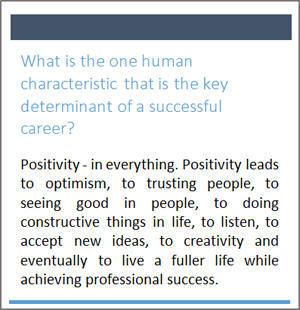
Besides being extremely lucky, I owe it all to my
education institutions and among them IBA played the
most important role. We never realized during our stay
in IBA how IBA reprogrammed our brains over a four-year
period and gave us tools to evaluate various
professional and personal situations in a methodical
manner to arrive at the best possible decisions. Among
other things, IBA taught me leadership, communication
and the ability to think better and deeper. All I did
was worked extremely hard and was never shy to take
risks. My academic institutions therefore contributed
significantly to my personal and professional success.
In your experience, is the perfect work-life balance
as evasive as it is renowned to be? Do you have any tips
in that regard for aspiring business graduates?
With few exception, successful people rarely achieve a
perfect work-life balance on consistent basis. Different
phases of our life are dominated by different set of
activities. I believe we all naturally have one or a few
passions at every stage of our life and we are inclined
to work towards those, be it personal, social or
professional. In today's fast changing and competitive
world, first generation success is extremely difficult
if one wants to achieve this balance too. Thus, I never
had this perfection and I never desired it either.
If you could pinpoint one human characteristic as the
key determinant of a successful career (e.g. attitude or
perseverance) what would that be?
Positivity - in everything. Positivity leads to
optimism, to trusting people, to seeing good in people,
to doing constructive things in life, to listen, to
accept new ideas, to creativity and eventually to live a
fuller life while achieving professional success.
Do you have any message for the alumni and students
of IBA?
Think about the purpose of your existence and try to
make a difference at a mass level. IBA graduates are the
luckiest and among the best professionals in the
country. This country has given all of us so much,
because of which we all carry a responsibility to give
back to this nation at some stage in our lives.
|
Related Links |
|
Take a sneak peek into the new IBA. View how your beloved institution has transformed leaps and bounds in recent years. |
|
Send us your request and we'll deliver your card. |
|
A hassle-free entry to campuses, access to on-campus facilities and offers from renowned companies. |
|
Featured Interviews
|